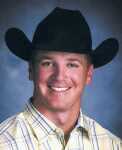Gulager captures steer wrestling championship

Fort Scott, Kan. -- Ever since he was a young boy, Stewart Gulager has known he wanted to be a cowboy, and earlier this year, his determination paid off.
The Fort Scott resident recently won the World Championship Steer Wrestling title at the 2005 International Professional Rodeo Association Finals Rodeo held in Oklahoma City, Okla., in January. Rodeo competitions are held throughout the year, then the finals are held at the beginning of the following year.
Gulager, who said he grew up with a passion for competing in rodeo events, competed last year against hundreds of other participants in more than 500 rodeos across the United States and Canada.
Prizes Gulager won at the IPRA event include a brand new saddle, a new belt buckle, three new pairs of boots, and money, he said. Gulager, a member of the IPRA since 1998 and also a member of the Professional Rodeo Cowboys Association, said the feeling he gets from competing in the physical events is unmatched.
"It's fun -- an adrenaline rush," he said.
Gulager placed in the top 15 in both steer wrestling and calf roping to qualify for the finals, then he was the top money winner for the year in steer wrestling. He also won the average prize money available for the last four performances at the finals.
After making it to the finals last year, but failing to win the championship, it felt nice to finally bring home the top prize, he said.
"It was good to finally win," Gulager said. "I didn't go real hard (last year)."
In steer wrestling, also known as bulldogging, the steer is released from a chute and a horse-mounted rider chases the steer, jumps or slides down off of the horse and wrestles the steer to the ground by twisting its horns. A 10-foot rope is fastened around the steer's neck to ensure the steer gets a head start.
One person, called a hazer, rides to one side of the steer, when it begins running, to ensure it runs in a straight line.
The steer wrestler waits behind the rope and then calls for the steer to be set free, after which the steer wrestler attempts to catch up to the running steer, grab its horns and bring it to the ground. An official waves a flag and a time is taken, marking the end of the contest.
The steer wrestler often reaches a speed of about 30 miles per hour in order to keep up with the steer, Gulager said.
Gulager, originally from Tahlequah, Okla., said he attended Fort Scott Community College in 1996-'97 on a rodeo scholarship and entered the world of professional rodeo shortly after. He said it was hard to determine which event he excelled at the most.
"I rope calves as good as I steer wrestle -- I guess I worked harder at steer wrestling this year."
There are several different aspects of rodeo -- when compared to other sports -- that many people don't realize, Gulager said.
"There's a lot of things that people don't see," he said. "The trailer, the truck, we have to pay our own entry fees. In other sports, win, lose or draw, you get a check. We're a one-man show. No team leader, no coach. It's about how bad you want it. We pay for our own food, the motels. If you don't win, you're out a lot of money."
Gulager, who now lives in Fort Scott with his wife Lindsey and 2-year old son Caden, said he will now take a year off from his beloved profession to spend time with his family.
"I'm going to spend some time with my son."
